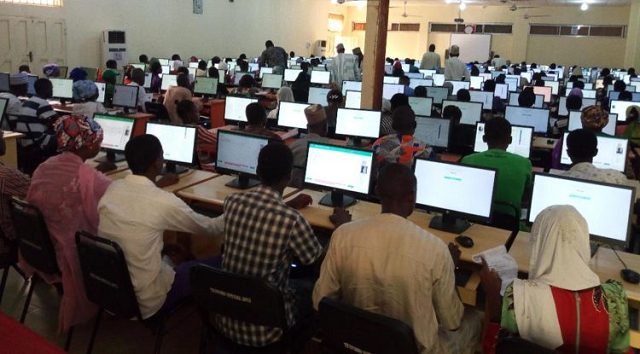According to Prof. Suwaiba Ahmad, the Minister of State for Education, the government is dedicated to guaranteeing a smooth transition to Computer-Based Testing for the West African Senior School Certificate Examination (WASSCE) and National Examination Council (NECO) exams.
She assured that all factors are being considered to ensure that no student or geographical location is disadvantaged when the CBT is fully implemented.
Reports indicate that Ahmad submitted it on Tuesday while monitoring the ongoing WASSCE in selected schools in Abuja, as part of preparations for the government’s planned full transition to CBT by 2027.
„Wir werden CBT nicht auf eine Weise einführen, die irgendeinen Schüler ausschließt. Every child will have the chance to take their exam, no matter their location or available infrastructure.
„Die Nigerianer sollten Geduld mit uns haben. She assured that all concerns are being taken seriously, and by the time CBT is fully implemented, no child will be disadvantaged.
She claims that the government is moving towards a CBT transition to tackle some of the issues associated with paper examination. She stated that all essential technical and infrastructural challenges would be thoroughly dealt with prior to the transition being made.
According to the Minister, students prefer CBT over traditional paper-based exams based on her interaction.
Based on my interaction with the students, they are pleased with the CBT examination and actually prefer it to the written method.
At a CBT centre, everything was organized and punctual; however, at a paper-based exam centre, the exam was not only delayed because of rain, but the script was also missing.
”These are the types of problems that CBT aims to get rid of. Since the system starts counting only when the student accesses the questions, CBT will guarantee that students receive their entire allotted exam time.
“This helps tackle issues such as delays due to weather, transport problems, and administrative oversights,” she stated.
She listed further that one of the solutions produced by CBT would be the eradication of widespread examination malpractices linked to paper-based examinations.
She clarified that by using personalized sets of questions for each candidate, the chances of impersonation, question leaks, and systemic answer sharing would be significantly diminished.
Read Also: Oborevwori: I’ll Drop Any Commissioner Who Fails to Deliver
As she stated, “We know how students and schools manipulate the system, but CBT will shut those doors.”
She mentioned that WAEC and NECO were collaborating with JAMB and other educational stakeholders to tackle significant issues, like electricity and internet infrastructure, that could impede the transition to CBT.
The Minister revealed intentions to utilize JAMB’s well-equipped CBT centres for upcoming exams, and to collaborate with state governments in identifying rural and urban challenges in order to create effective solutions.
She stated that CBT centres could replace school centres in order to address infrastructural challenges.
“When we launch the CBT examination, we will utilize the existing JAMB centres. We will not utilize school centres, as you correctly pointed out, there are schools in rural areas without electricity.
”The school we are presently evaluating lacks power in the examination room. Were CBT to be carried out here today, it would present a significant challenge.
She emphasized, “All of these factors are under consideration as we plan meticulously to guarantee that when we initiate this CBT, every student has a fair chance.”
Join Television Nigerian Whatsapp Now
Join Television Nigerian Facebook Now
Join Television Nigerian Twitter Now
Join Television Nigerian YouTUbe Now





